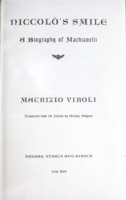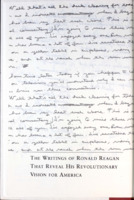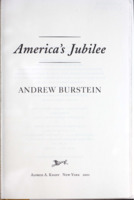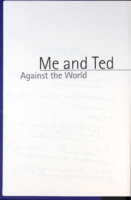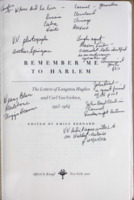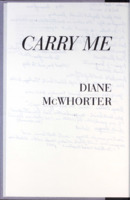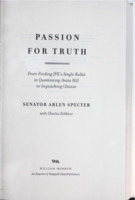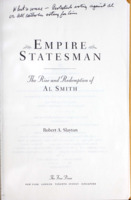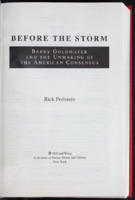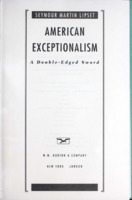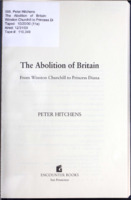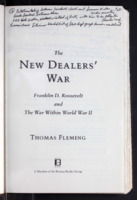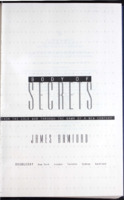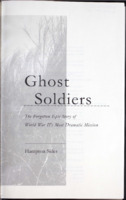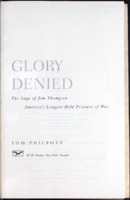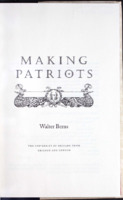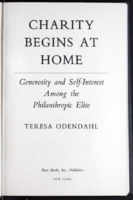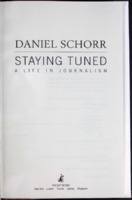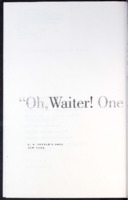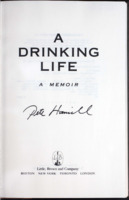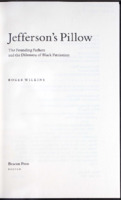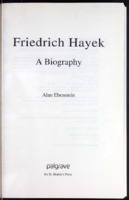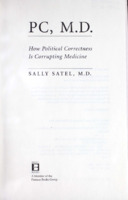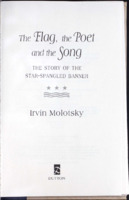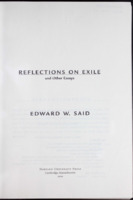Search
540 items
-
Niccolò's smile : a biography of Machiavelli
In Niccolo's Smile, Maurizio Viroli brings to life the fascinating writer who was the founder of modern political thought. Niccolo Machiavelli's works on the theory and practice of statecraft are classics, but Viroli suggests that his greatest accomplishment is his robust philosophy of life - his deep beliefs about how one should conduct oneself as a modern citizen in a republic, as a responsible family member, as a good person. On these subjects Machiavelli wrote no books; the text of his philosophy is his life itself, a life that was filled with paradox, uncertainty, and tragic drama.--BOOK JACKET. -
Reagan, in his own hand
Consists largely of radio addresses written from 1975-1979. -
America's jubilee
On July 4, 1826, the United States celebrated its fiftieth birthday with parades and speeches across the country. But what ultimately sanctified the national jubilee in the minds of the celebrants was an extraordinary coincidence: the nearly simultaneous deaths of Thomas Jefferson and John Adams, the last pillars of the original republic, already venerated as legends in their own time. It was a watershed in the nation's history, a bright moment when the successors to the Revolutionary dream examined their own lives as they took inspiration from and found nostalgia in the accomplishments of the founders. "In this book, the distinguished historian Andrew Burstein explores what it was to be an American in 1826. Drawing on private diaries and letters, daily newspapers, and long-buried publications, he shows us the personal lives behind the pageantry and reveals an acutely self-conscious nation - anxiously optimistic about its future, eager to romanticize the Revolutionary past." "In this portrait of the United States in its jubilee year, Burstein shows how 1826 marked an unforgettable time in the republic's history, when a generation embraced the legacy of its predecessors and sought to enlarge its role in America's story."--BOOK JACKET. -
Me and Ted against the world : the unauthorized story of the founding of CNN
From the creator of CNN comes an inside, unauthorized look at one of the great adventure tales of modern media. the tumultuous launch of CNN, the world's first 24-hour, all-news network of photos. -
Remember me to Harlem : the letters of Langston Hughes and Carl Van Vechten, 1925-1964
An edited collection of letters between Langston Hughes and Carl Van Vechten, 1925-1964. -
Carry me home : Birmingham, Alabama, the climactic battle of the civil rights revolution
McWhorter's magisterial narrative tells the story of the civil rights movement in Birmingham, from the '50s through the '60s. In the tradition of such histories as Parting the Water and Walking in the Wind, Carry Me Home" documents the real story of integrating the South. It tells the story of the city called Bombingham, from the fifties through the sixties. It focuses on the black freedom fighters as well as those who resisted them--country-club elite, police, vigilantes. -
Passion for truth : from finding JFK's single bullet to questioning Anita Hill to impeaching Clinton
The senator tells the story of his life, "naming names, identifying where the system worked and where it failed--and even admits to his own mistakes."--Jacket. -
Empire statesman : the rise and redemption of Al Smith
Franklin Roosevelt is said to have explained Al Smith, and his own New Deal, with these words; Practically all the things we've done in the federal government are the things Al Smith did as governor of New York." Smith, who ran for president in 1928, not only set the model for FDR, he also taught America that the promise of the country extends to everyone and no one should be left behind." "The story of this trailblazer is the story of America in the twentieth century. A child of second-generation immigrants, a boy self-educated on the streets of the nation's largest city, he went on to become the greatest governor in the history of New York; a national leader and symbol to immigrants, Catholics, and the Irish; and in 1928 the first Catholic major-party candidate for president. He was the man who championed safe working conditions in the wake of the Triangle Shirtwaist fire. He helped build the Empire State Building. Above all, he was a national model, both for his time and for ours."--Jacket. -
Before the storm : Barry Goldwater and the unmaking of the American consensus
Before the Storm begins in a time very much like the present - the tail end of the 1950s, with America affluent, confident, and convinced that political ideology was a thing of the past. "But when John F. Kennedy was elected President in 1960, conservatives - Midewestern businessmen, Sun Belt suburbanites, Southern segregationists, and thousands of college students - formed a movement to challenge the center-left consensus. They chose as their hero Barry Goldwater - a rich, handsome Arizona Republican who hated liberalism even mor than he did Moscow - and they grew determined to see him elected President." "Goldwater was trounced by Lyndon Johnson in 1964. The pundits left conservatism for dead. But by the campaign's end, the consensus found itself squeezed from the left and from the right. As early as 1967 Johnson's Great Society programs were blocked by conservatives in Congress, and the movement had arrived; by 1980 a new conservative standard-bearer, Ronald Reagan, was elected President. Today many of Goldwater's ideas are conventional wisdom for Republications and Democrats alike." "Rick Perlstein's original account of the 1960s as the cradle of the conservative movement is also about a revolution in political culture; fears of threats abroad giving way to concerns of disorder at home; campaigns plotted in back rooms giving way to those staged for television; Americans beginning to think of their nation as divided, not united. Filled with portraits of figures from George Wallace to Nelson Rockefeller to Bill Moyers, Before the Storm is a narrative history that adds greatly to our understanding of that controversial era - and of our own."--Jacket. -
American exceptionalism : a double-edged sword
Work by Seymour Martin Lipset on American exceptionalism. -
The abolition of Britain : from Winston Churchill to Princess Diana
Writing with passion and flair, Hitchens targets the pernicious effects of TV culture, the corruption and decay" of the English language, the loss of politeness, and the "syrupy confessional mood" brought on by the death of Diana, which Hitchens contrasts with the somber national response to the death of Winston Churchill. If there is a term that summarizes everything that has gone wrong in Britain, it is "Tony Blairism," which Hitchens sees as having rewritten England's history, trivialized its journalism, subverted its educational system and cultural standards, and overthrown accepted notions of patriotism, faith, and morality.The New Britain is government by focus group in which people are told what to feel as a way of preventing them from asking how they want to be governed."--BOOK JACKET. -
The New Dealers' war : Franklin D. Roosevelt and the war within World War II
Solidly challenging the idea that World War II was a good war," The New Dealers' War offers a drastically new look at the conflict that has dominated the history of the twentieth century. For many Americans, Franklin Delano Roosevelt's role in leading the United States throughout most of World War II has made him one of America's most venerated presidents. Biographers have all but lionized FDR for his war leadership, a tendency that has been reinforced lately as Americans celebrate the riches of memory by saluting the generation that won that titanic global conflict with blockbuster movies and best-selling books. But, as Thomas Fleming reminds us, memory is not history, and in The New Dealers' War, he reveals an entirely different Roosevelt from the one that most people like to remember." "Unquestionably, The New Dealers' War is one of those rare books that will force readers to rethink what they think they know about one of the most pivotal events in the American past. It will surely spark debate about FDR's role in shaping the course of history in the twentieth century."--BOOK JACKET. -
Body of secrets : anatomy of the ultra-secret National Security Agency : from the Cold War through the dawn of a new century
This scrupulously documented account of the NSA's tireless hunt for intelligence dissects an organization that monitors enemies and allies alike--a leviathan whose influence has both prevented and provoked world conflict. Relying on testimony and documents never meant for the public eye, Bamford reveals espionage activities and profiles the commanders and the soldiers responsible for the covert activities performed by this clandestine agency. A major work of history and investigative journalism, Body of secrets is a riveting analysis of this powerful agency's history and its future. -
Ghost soldiers : the forgotten epic story of World War II's most dramatic mission
A narration of the 1945 march to rescue 513 POWs, including the last survivors of the Bataan Death March, from a prison in the Philippines. -
Glory denied : the saga of Jim Thompson, America's longest-held prisoner of war
He was born in New Jersey in 1933 & only dreamed of being a military man. Marrying shortly after high school, he joined the army in 1956 & was dispatched to Vietnam in 1963 when America still seemed still innocent. Jim Thompson would have led a perfectly ordinary, undistinguished life had he not been captured four months later, becoming the first American prisoner in Vietnam and, ultimately, the longest-held prisoner of war in American history. Forgotten Soldier is Thompson's epic story, a remarkable reconstruction of one man's life & a searing account that questions who is a real American hero. Examining the lives of Thompson's family on the home front, as well as his brutal treatment & five escape attempts in Vietnam, military journalist Tom Philpott weaves an extraordinary tale, showing how the American government intentionally suppressed Thompson's story. "Jim's story, as movingly portrayed in Tom Philpott's oral history, is in many ways America's own."--Senator John McCain. Thompson was captured March 1964, three months after arriving in Vietnam, and was held until 1973. Philpott, author of the weekly column Military Update, recounts his childhood, marriage, early days in the army, years as a prisoner of war, release and return, and the family and personal problems that awaited him after so long. -
Making patriots
The author explores the role of patriotism in American life, tracing the history of patriotic acts and sentiment from the ancient Greeks to the present and probing the role of citizen in an increasingly jaded American society. Samuel Johnson once remarked that patriotism is the last refuge of scoundrels, but is he right? Recent events such as the bombing of federal buildings and the formation of threatening militias in the name of patriotism suggest that he may have been on to something. But the United States has also seen its share of heroes, patriots who, over the course of history, have willingly put their lives at risk for this country and, especially, its principles. And this is even more remarkable given that the United States is a country founded on the principles of equality and democracy that encourage individuality and autonomy far more readily than public spiritedness and self sacrifice. Walter Berns's Making Patriots is a pithy and provocative essay on precisely this paradox. How is patriotism inculcated in a system that, some argue, is founded on self interest? Expertly and intelligibly guiding the reader through the history and philosophy of patriotism in a republic, from the ancient Greeks through contemporary life, Berns considers the unique nature of patriotism in the United States and its precarious state as we enter the twenty first century. And he argues that while both public education and the influence of religion once helped to foster a public minded citizenry, the very idea of patriotism is currently under attack. Berns finds the best answers to his questions in the thought and words of Abraham Lincoln, who understood perhaps better than anyone what the principles of democracy meant and what price adhering to them may exact. The graves at Arlington and Gettysburg and Omaha Beach in Normandy bear witness to the fact that self interested individuals can become patriots, and Making Patriots is a compelling exploration of how this was done and how it might be again. -
Charity begins at home : generosity and self-interest among the philanthropic elite
Teresa Jean Odendahl analyzes donation patterns of individuals, private foundations and corporations. -
Staying tuned : a life in journalism
The last of the legendary Edward R. Murrow news team still active in journalism tells of adventures in the McCarthy anti-Communist hearings, Watergate coverage, the CBS bureau in Moscow, and revelations of CIA and FBI misdeeds that brought him before the House Ethics Committee and threatened with a jail term if he didn't name his sources. (He didn't, and the threat was never carried out.)--Jacket. -
Oh, waiter! One order of crow! : inside the strangest presidential election finish in American history
CNN's political and media analyst examines the 2000 campaign and all the unexpected results. -
A drinking life : a memoir
Hamill, a journalist and author from Brooklyn, reflects on how drinking influenced the first half of his life. -
Jefferson's pillow : the founding fathers and the dilemma of Black patriotism
Wilkins examines the lives of the founding fathers to discover how, "race and slavery still impede our progress." -
Friedrich Hayek : a biography
This book tells the story of one of the most important public figures of the twentieth century. It is the first full biography of Friedrich Hayek, the Austrian economist who became the greatest philosopher of liberty in our time.."In this detailed portrait, Alan Ebenstein chronicles the life, works, and legacy of a visionary thinker, from Hayek's early years as the scholarly son of a physician in fin de siecle Vienna to his remarkable career as an economist and political philosopher in London, New York, and Chicago. It was an immensely fruitful life, set against two world wars, the Great Depression, the rise of Nazism, and, during his last years, the historic emergence of free market societies from the collapse of Communism. Throughout it all Hayek struggled - in a brilliant circle of economists, philosophers, political scientists, and other intellectuals - to come to grips with the wrenching transformations of the modern world."--BOOK JACKET. -
PC, M.D. : how political correctness is corrupting medicine
Drawing on a wealth of information, much of it never revealed before, PC, M.D. documents for the first time what happens when the tenets of political correctness - including victimology, multiculturalism and the rejection of fixed truths and individual autonomy - are allowed to enter the fortress of medicine. Consider these examples. A professor at the Harvard School of Public Health teaches her students that racial discrimination causes high blood pressure among blacks - an unsubstantiated and dangerous truth". Former psychiatric patients, calling themselves "consumer-survivors," condemn the health care system for violating their human rights. They are on a crusade to "limit the powers of psychiatry by making consumers full partners in diagnosis and treatment".And nurses charge that they are so oppressed by the male-dominated medical system that they can't give their patients optimal care." "The consequences of putting politics before health are far-reaching, argues Satel. It wastes tax-payer money on bogus research and diverts resources that could be used to discover authentic causes of suffering, provide proven therapies, and rigorously investigate new ones. PC, M.D. is a powerful wake-up call to the medical profession and to patients, who are the ultimate victims of these disturbing trends."--BOOK JACKET. -
The flag, the poet, and the song : the story of the Star-Spangled Banner
We all take our national anthem for granted. But it was not always so. In this book, New York Times reporter Irvin Molotsky tells the story behind the story and, in the process, reveals an important and little-known piece of our country's heritage. Molotsky brings both legendary and unknown events and figures to life - from the flag's seamstress to the military heroes of the War of 1812.He charts the events leading up to the war, and the far-reaching impact this obscure conflict has had on our national psyche. The Flag, the Poet, and the Song also uncovers the facts and fallacies surrounding the flag and the song, from the tremendous size of the flag to why we continue trying to sing our anthem to this day.--BOOK JACKET. -
Reflections on exile and other essays
Edward Said's volume contains nearly 50 essays on literature, culture, the Middle East, philosophy, history, the arts, and current events.
